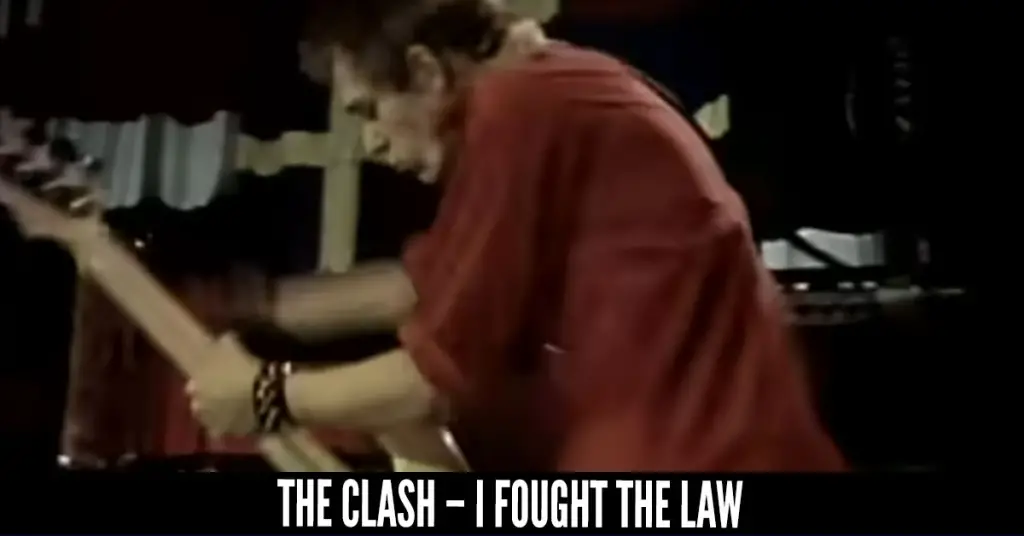When The Clash roared through “I Fought the Law” in 1979, they didn’t just cover a song—they claimed it, drenched it in sweat and urgency, and turned it into a battle cry for the disenchanted. With pounding drums, snarling guitars, and Joe Strummer’s defiant growl, the band took a tidy slice of 1960s pop rebellion and transformed it into a punk rock anthem of resistance.
It wasn’t just that The Clash fought the law—it’s that they sounded like they’d do it again. And this time, they might win.
The Song’s Origins: From Buddy Holly to the Bobby Fuller Four
“I Fought the Law” wasn’t born in the punk era. It was originally written by Sonny Curtis of The Crickets, Buddy Holly’s backing band, in the late 1950s. The song gained wider popularity when The Bobby Fuller Four released their more polished, surf-rock-inspired version in 1966. That version was catchy, with a clean-cut, tragic rebel vibe—but it still carried the heartbreak of a man who had lost everything to a life of crime.
“I fought the law and the law won…”
When Fuller sang it, it felt like a shrug of sad resignation.
When The Clash sang it, it sounded like a riot in the streets.
The Clash Take Over
By the time The Clash recorded their version of “I Fought the Law” in 1979, they were already the most politically charged band in British punk. Their self-titled debut had lit a fire under a generation, and their second album, Give ’Em Enough Rope, had shown they were more than just noise—they were a voice.
This version of “I Fought the Law” was originally released on their EP in the U.S., and it quickly became one of their most iconic songs. It appeared on the American release of their debut album and helped break them into mainstream consciousness in the States.
From the opening guitar riff, there’s a sense of reckless momentum. Mick Jones’s guitar is raw and biting, and Joe Strummer’s vocals come in like a busted lip and a warning:
“Breakin’ rocks in the hot sun / I fought the law and the law won…”
But unlike earlier versions, there’s no self-pity here. The Clash’s take isn’t about regret—it’s about confrontation. It’s the sound of a man who knows he’s lost but refuses to apologize. The spirit is pure punk: bitter, loud, and defiantly alive.
A Clash Between Authority and Individual
The genius of The Clash’s version lies in how timeless the song becomes in their hands. The line between law and justice gets blurred. Is the narrator a criminal, or just a product of a broken system? Is “the law” truly right, or just the winner?
In the hands of Strummer and company, the song takes on layers of meaning. It’s not just about a robbery gone wrong. It’s about youth versus establishment, freedom versus conformity, and the kind of small, everyday defiance that defines punk as a movement.
Impact and Legacy
“I Fought the Law” became one of The Clash’s signature songs, often played at their live shows and immortalized in punk culture. It helped solidify their reputation as the thinking person’s punk band—musically aggressive, yes, but also lyrically sharp and culturally aware.

Its influence stretches far beyond the punk genre. Over the years, artists ranging from Green Day to Dead Kennedys have taken their own cracks at the song, but The Clash’s version remains the definitive reinterpretation. It’s been used in films, ads, political protest playlists, and anywhere a middle finger to authority is needed.
Final Thoughts
When The Clash sang “I Fought the Law,” they didn’t just revive a song—they rearmed it. They turned it into a working-class war cry, a reminder that even when you lose, your voice can still be loud enough to shake the system.
It’s not about glorifying crime. It’s about questioning power.
And when that iconic riff kicks in, it still feels like a door being kicked open.
Because sometimes, the law may win.
But punk never surrenders.


Facebook Comments